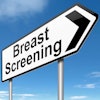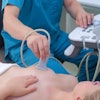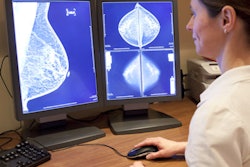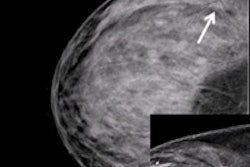A Canadian medical advisory group published guidelines on Monday for breast screening that recommend that women ages 50 to 74 receive mammography exams every two to three years rather than annually. The group also advised that women ages 40 to 49 not be routinely screened at all.
The Canadian Task Force on Preventive Health Care (CTFPHC) also said that available evidence does not support the use of MRI, clinical breast examination, or breast self-examination to screen for breast cancer among women at average risk (Canadian Medical Association Journal, November 21, 2011).
"Although screening mammography reduces mortality from breast cancer among women aged 40 to 74 years, the absolute benefit is small -- especially for younger women -- and is partially offset by harms caused by unnecessary intervention," the CTFPHC wrote. "Despite its potential to reduce mortality, appropriate use of mammography will require thoughtful discussion between clinicians and patients about the balance between benefits and harms."
The new guidelines have immediately drawn criticism from breast screening advocates. The controversy has also become the latest battle in an ongoing war between screening proponents and a controversial antiscreening group from the Nordic Cochrane Centre in Denmark, which issued a letter praising the new Canadian guidelines.
A Canadian USPSTF?
Much like the U.S. Preventive Services Task Force (USPSTF), the CTFPHC is an independent panel of clinicians and methodologists that makes recommendations about clinical procedures. A smaller subgroup of CTFPHC, the Breast Cancer Workgroup, established key questions and an analytic framework for the systematic review of screening for breast cancer. The group based its analysis on the U.S. Preventive Services Task Force's 2009 screening mammography recommendations, choosing to "update [USPSTF's] search to avoid duplication of effort."
The following recommendations update the CTFPHC's 2001 guidelines (which stated that women ages 50 to 69 should be screened annually):
- Women ages 40 to 49 need not receive routine screening with mammography.
- Women ages 50 to 69 and those between 70 and 74 should be routinely screened with mammography every two to three years.
- Routine breast cancer screening with MRI for women of average risk of breast cancer is not recommended.
- Routine clinical breast examinations, alone or in conjunction with mammography, are not recommended.
- Clinicians should not advise women to routinely practice breast self-examination.
"Little is known about the benefit and harms of screening using mammography for women older than 74 years or younger than 40 years," the CTFPHC wrote. "New technologies such as MRI scans have not been adequately studied in the screening of women at average risk."
Editorial response
In an editorial response to the CTFPHC guidelines also published in the Canadian Medical Association Journal, Dr. Peter Gøtzsche of the Nordic Cochrane Centre wrote that it is time to stop mammography screening, since "the main effect of the protocol is to produce patients with breast cancer from among healthy women who would have remained free of breast disease for the rest of their lives had they not undergone screening."
"The best method we have to reduce the risk of breast cancer is to stop the screening program," Gøtzsche wrote. "This could reduce the risk by one-third in the screened age group, as the level of overdiagnosis in countries with organized screening programs is about fifty percent. If screening [was] a drug, it would have been withdrawn from the market ... which country will be first to stop mammography screening?"
Gøtzsche congratulated the CTFPHC for its new recommendations, calling the guidelines "more balanced and more in accordance with the evidence than any previous recommendations."
"These guidelines are an important step in the right direction, away from the prevailing attitude that a woman who does not undergo screening is irresponsible," he wrote. "Research even suggests that it may be most wise to avoid screening altogether, at any age."
Debate rages on
But the task force's new breast cancer screening guidelines have immediately drawn criticism. They ignore the results of landmark randomized, controlled trials that show that regular screening significantly reduces breast cancer deaths in these women, said the American College of Radiology (ACR) in a statement, also released on Monday.
"Panels without profound expertise in breast cancer screening should not be issuing guidelines," said Dr. Barbara Monsees, chair of the ACR's Breast Imaging Commission, in the statement. "These recommendations are derived from flawed analyses and they defy common sense. Women and providers who are looking for guidance are getting bad advice from both [the U.S. and Canadian] task forces."
The guidelines also make it clear that opposition to mammography screening is all about saving money rather than saving lives, wrote mammography screening advocate Dr. Daniel Kopans of Massachusetts General Hospital in an email to AuntMinnie.com.
"The CTFPHC admits that screening mammography save lives, but their rationale for advising against screening for women ages 40 to 49 and extending the time between screens for older women is clearly based on cost," Kopans wrote. "The Canadian task force admits drawing most of their information from the U.S. Preventive Services Task Force, [and] given that the USPSTF ignored major studies in Sweden and the Netherlands in their pronouncements, it is not surprising that the Canadian task force ignored the same major sources of information."
In fact, more than 40 clinicians involved in breast screening programs around the world inked a letter to the editor, published November 19 in the Lancet, stating that the Nordic Cochrane Centre is orchestrating "an active antiscreening campaign" based on "erroneous interpretation of data from cancer registries and peer-reviewed articles."
"These individuals, making claims of poor methods, selectively discount overwhelming scientific evidence from numerous randomized trials in different countries that organized screening reduces breast cancer mortality," the authors wrote. "They claim that the significant decrease in breast cancer mortality achieved by screening is due to improvements in treatment alone, discounting the benefits of early detection. If true, this would imply that breast cancer is an exception among adenocarcinomas in that early detection does not improve prognosis -- a claim contrary to the evidence."
Women would be better served by focusing efforts on how best to provide breast screening, not whether to provide it, the group wrote.
"We consider the interpretation by [Nordic Cochrane Centre authors] Jørgensen, Keen, and Gøtzsche about the balance of benefits and harms to be scientifically unsound," the letter concluded.
In fact, much of the misinformation on breast cancer screening has come from the Nordic Cochrane Centre, headed by Gøtzsche, Kopans told AuntMinnie.com.
"The Canadian task force is supported by Peter Gøtzsche, who has been opposed to breast cancer screening for over a decade, first violating the rules of legitimate trial analysis in 2000," Kopans wrote. "Dr. Gøtzsche's approaches have been refuted and repudiated by numerous analysts, yet the U.S. and Canadian task forces relied on much of this misinformation."
Mammography screening has fulfilled all the requirements of an efficacious test, Kopans said: It finds cancers at a smaller size and earlier stage, and its use results in a statistically significant decrease in breast cancer deaths in randomized, controlled trials.
"There is not much more that can be done to prove its efficacy," he wrote. "One has to ask what is behind the persistent effort to reduce access for women to screening."




















